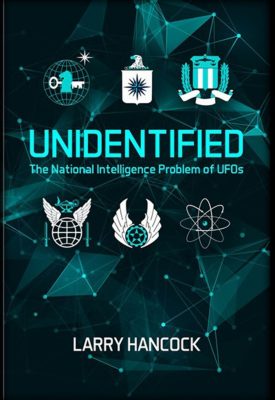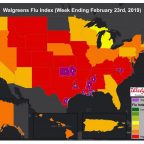Unidentified – The National Intelligence Problem of UFOs, By Larry Hancock
There is simply no doubt that unidentified aerial objects were taken seriously by military intelligence. Over some three decades both military and civilian intelligence groups used the standard methods of conventional and technical intelligence to resolve what was officially stated to be a serious security and air defense problem. Those well-established methods failed, frustrating those involved in investigations and creating serious public relations and credibility problems for the U.S. Air Force. Ultimately the only solution to the UFO problem was to simply abandon it. In the end the intelligence challenge of highly anomalous “unknowns” – unconventional aerial objects internally and confidentially described in both Air Force and CIA reports as national security threats – had literally beaten the system.

This is the book weve been waiting for Unidentified the study the government did not do. (PRNewsfoto/Treatise Publications)
“The conclusion appears inescapable that some type of flying object has been sighted. Identification and the origin of these objects is not discernible at this Headquarters.”
Major General C.P. Cabell, Director of Intelligence, U.S. Air Force, November 3, 1948
Unidentified explores that intelligence failure, beginning during World War II and continuing over some three decades of official inquiries. It also profiles the events – including inter-service and inter-agency political posturing – which prevented the problem from being elevated to a level of true national security tasking. The ongoing Air Force decision to study the problem only at the level of individual incidents and the larger failure to task the broader intelligence community with a longer term, strategic analysis of security related UFO activities ensured that the fundamental problem was simply not addressed. The end result was nothing more than over a thousand highly unconventional and anomalous UFO reports officially classified and archived as “Unknowns.”
“Sightings of unidentified flying objects at great altitudes and traveling in the vicinity of major U.S. defense installations are of such a nature that they are not attributable to natural phenomena or known types of aerial vehicles.”
Marshall Chadwell, Assistant Director, Office of Scientific Intelligence, Central Intelligence Agency, December, 1952
In Unidentified, Larry Hancock turns to the strategic intelligence practices – better known as indications analysis – that were not tasked to the national intelligence community. He presents a series of indications studies which suggest something very different from the official statement on UFOs officially offered by the Air Force. In these studies Unidentified examines and details patterns of UFO activity strongly suggesting that “unknown parties” actively probed America’s strategic military capabilities – at the same time demonstrating an undeniable ability to project force against the nation’s atomic war-fighting complex. Beyond that, the operational patterns in the UFO activities revealed in the analysis also suggest a clear effort at “messaging,” one which appears to have failed.
“Alert message from Commander in Chief NORAD to all units – ‘suspicious objects’ have been recently sighted at Loring AFB, Wurthsmith AFB, Malmstrom AFB and the Canadian Air Force station at Falconbridge, Canada. Attempts at interception and identification with Air Guard helicopters, SAC helicopters and NORAD F-106 interceptors have all failed.”
NORAD Command Directors Log, November 11, 1975
Larry Hancock brings his formal training in history and cultural anthropology to his research and writing on military history and national security subjects. Following service in the United States Air Force, his career in computer/communications and technology marketing allowed him the opportunity to become involved in and consult on strategic analysis and planning studies related both to capital investment and business/marketing planning. His current interests include the application of indications and pattern analysis to long term studies of national security subjects.
With six books in print, Hancock’s related works include NEXUS (the CIA and Political Assassination), Shadow Warfare (covert political and paramilitary action) and Surprise Attack (national command authority and command and control practices during crises).






